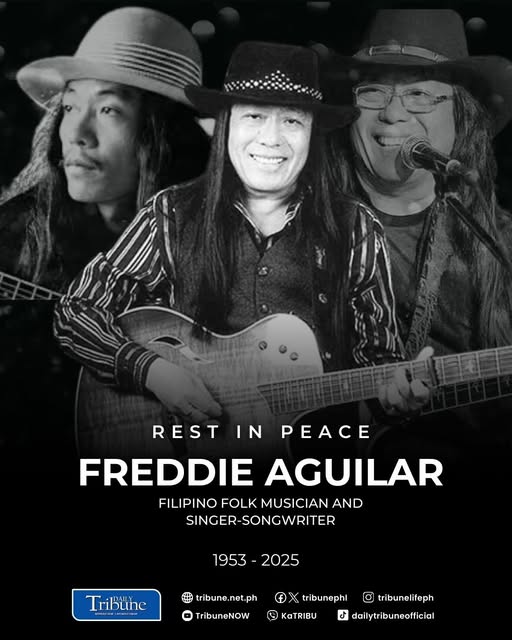BREAKING: OPM Icon Freddie Aguilar Dies at 72 — Nation Mourns a Musical Legend
MANILA, Philippines — The Philippines is mourning the loss of a cultural icon. Freddie Aguilar, the legendary singer-songwriter and voice behind some of the most powerful and enduring songs in Original Pilipino Music (OPM), has died at the age of 72.
The news of Aguilar’s death was confirmed Tuesday, May 27, by George Briones, general counsel of the Partido Federal ng Pilipinas (PFP), where Aguilar served as national executive vice president. No official cause of death has been publicly disclosed at this time, but sources close to the family say he passed peacefully.
A National Treasure
Born Ferdinand Pascual Aguilar on February 5, 1953, Freddie Aguilar became a household name in the late 1970s, capturing the hearts of Filipinos with his raw, heartfelt lyrics and traditional folk melodies. His breakout song, “Anak,” released in 1978, became the most commercially successful Filipino song in history—translated into more than two dozen languages and selling over 33 million copies worldwide.
“Anak” told the story of parental love, regret, and redemption, and its universal message struck a chord far beyond the Philippines. The song became an anthem of reflection for generations of listeners and remains a staple in Filipino homes and karaoke machines across the globe.
Voice of the People
Freddie Aguilar’s music was more than entertainment—it was a voice for the voiceless. His songs often tackled themes of poverty, injustice, and national identity. With tracks like “Magdalena,” “Mindanao,” and his stirring rendition of “Bayan Ko,” Aguilar used his platform to highlight the struggles of ordinary Filipinos and call attention to political and social issues.
During the 1986 People Power Revolution, “Bayan Ko” became a rallying cry for democracy, resistance, and unity. Though not originally written by him, Aguilar’s version became the most iconic, symbolizing the fight against tyranny and the hope for a better future.
A Lifetime of Honors and Advocacy
Aguilar’s career spanned five decades, and his contributions to Filipino culture earned him numerous awards and honors. He received international recognition, including the Asia Star Award, and remained one of the Philippines’ most respected musical artists.
Despite his fame, Aguilar remained deeply rooted in his values. He often used his influence to advocate for cultural preservation and national pride, encouraging younger generations to love their country and speak up through art.
In later years, he continued to perform at his own music bar, Ka Freddie’s, where he connected with fans and nurtured new talent. Always passionate, always outspoken, Freddie Aguilar remained active in both music and politics until his final days.
A Nation in Mourning
As news of his passing spreads, tributes are pouring in from fellow artists, political leaders, and fans around the world. Many recall how Aguilar’s music was the soundtrack to their youth, how his lyrics gave voice to their hopes, fears, and frustrations.
“Freddie Aguilar wasn’t just a singer—he was the conscience of our nation,” one fan wrote. “He made us proud to be Filipino. He reminded us of our roots.”
The legacy of Freddie Aguilar will not be forgotten. His songs remain etched in the collective memory of the Filipino people—timeless reminders of love, struggle, and patriotism.
Final Arrangements
Details on Aguilar’s wake and funeral are expected to be released in the coming days. The public is encouraged to join in commemorating the life and music of a man who gave so much of himself to his country and its people.
Rest in power, Ka Freddie. Your voice may be silent, but your song lives on.

